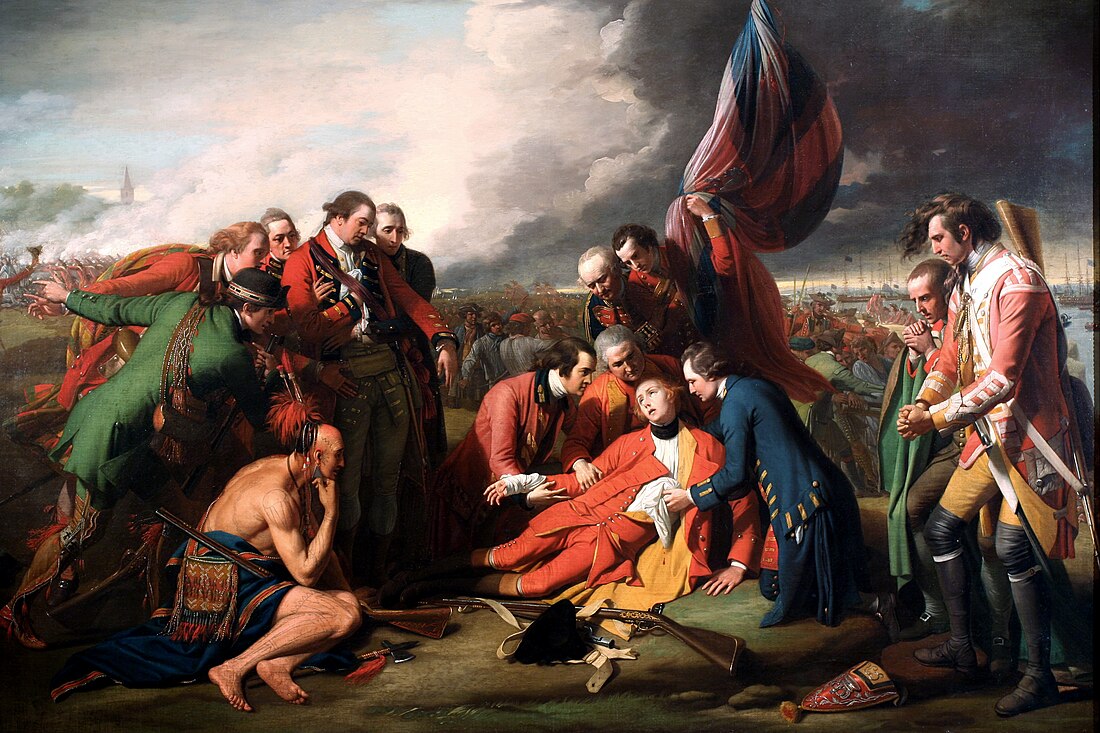Top Qs
Timeline
Chat
Perspective
1775 in Canada
From Wikipedia, the free encyclopedia
Remove ads
Events from the year 1775 in Canada.
This article needs additional citations for verification. (September 2023) |
Incumbents
Governors
Events
- April 19 – The American War of Independence begins, at Concord and Lexington, Massachusetts.
- May 1 – A bust of George III is found, in Montreal, adorned with beads, cross, and mitre, with the words "Pope of Canada: Sot of England." A reward of 500 guineas does not lead to apprehension of the culprit.[citation needed]
- May 10 – Ethan Allen takes Fort Ticonderoga.
- June 9 – Martial law is proclaimed in Canada.[2]
- August 21 – Generals Schuyler and Richard Montgomery, with 1,000 American Patriots come to Canada, and invite the inhabitants to rebel.[citation needed]
- September 17 – Montgomery besieges Fort St. Johns.
- September 25 – Attempting to take Montreal, Ethan Allen and many of his 150 followers are captured, at Longue Pointe, and are sent to England.
- October 18 – American Patriots capture Chambly.
- October 25 – On Benedict Arnold's expedition to Quebec from New England, his force begins crossing the height of land between Maine and Canada for the descent to the St. Lawrence River.
- November 3 – Hindered by Colonel Warner, of Vermont, Governor Guy Carleton cannot relieve St. Johns, which surrenders to Montgomery.
- November 12 – General Montgomery tells Montrealers that, being defenceless, they cannot stipulate terms; but promises to respect personal rights. He demands the keys of public stores, and appoints 9 a.m. tomorrow for the army's entrance, by the Recollet gate. (see "Nov 12, 1775 Articles of Capitulation")
- November 13 – The invaders appropriate royal stores.
- December 31 – At the Battle of Quebec, British forces repulsed an attack by the Continental Army to capture Quebec City and enlist French Canadian support.
- Having captured Montreal, American Patriot troops fail to take Quebec City or elicit local support, and withdraw within a year.
Remove ads
Births
- April 13 or 16 – Charles James Stewart, clergyman of the Church of England, bishop, and politician (d.1837)
- April 25 – William Warren Baldwin, doctor, militia officer, jp, lawyer, office holder, judge, businessman, and politician (d.1844)
- May 24 – Matthew Whitworth-Aylmer, 5th Baron Aylmer, army officer and colonial administrator (d.1850)
- September 13 – Laura Secord, heroine of the War of 1812 (d.1868)
- November 28 – Jean-Charles Létourneau, politician (d.1838)
Deaths
- January 3: Robert Campbell, merchant and political figure in Nova Scotia. (b.1718)
- November 3: Juan José Pérez Hernández, naval officer and explorer (b. ca. 1725)
References
Wikiwand - on
Seamless Wikipedia browsing. On steroids.
Remove ads

